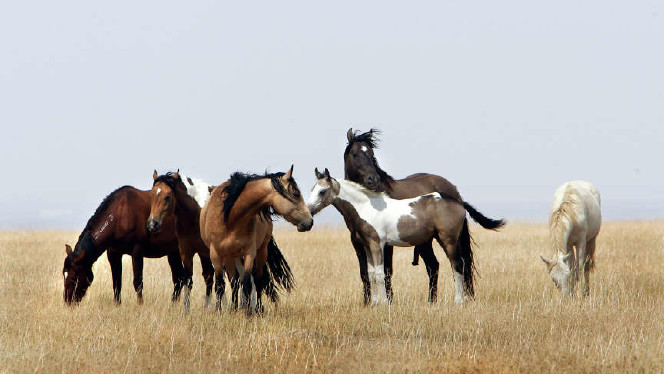By Paul Foy, Associated Press
September 30th, 2012 @ 5:35pm
SALT LAKE CITY (AP) - Federal officials plan to round up thousands of wild horses and burros across six Western states starting Monday.
The roundups will take place through February on drought-stricken range lands in Idaho, New Mexico, Nevada, Oregon, Utah and Wyoming.
Contractors for the Bureau of Land Management will use helicopters plus bait- and water-trapping methods to corral 3,500 wild horses and burros, officials said.
In addition, more than 900 other horses will be captured for birth control injections and returned to range lands.
The government is already holding 47,000 horses, most of them on green pasture in the Midwest. Bureau of Land Management officials said it was a popular misconception that they send horses to slaughterhouses. The animals are protected under the 1971 Wild Free-Roaming Horses and Burros Act.
A small number of horses are put up for adoption, but most horses are kept until their final days in permanent corrals, officials said.
Owners of adopted horses must swear under the penalty of law that they do not plan to send horses to slaughter, said Heather Emmons, a BLM spokeswoman in Reno, Nev.
The BLM's ability to care for ever-rising numbers of wild horses is a decision left to Congress, she said. The BLM says there are 11,000 more wild horses roaming public lands across the West than belong there.
In all, there are 37,300 wild horses and burros on public range lands across 10 Western states, the government says.
Officials said they have no choice but to cull wild horse herds. With virtually no predators, they say, the herds can double in population every four years.
Horse advocacy groups have been critical of government roundups and what they call the rough treatment of horses gathered up.
"They aren't placing enough wild horses through adoption so they need to put a freeze on roundups," said Anne Novak, executive director of Berkeley, Calif.-based group Protect Mustangs. "Killing them is not a solution. Selling them to slaughter is not a solution. They need to be responsible for their actions and stop the gluttony of roundups at taxpayer expense."
BLM officials say comments suggesting they kill horses are irresponsible.
"We do not send horses to slaughterhouses," said Chris Hanefeld, a BLM spokesman in Ely, Nev. "You can quote me."
Several multi-month roundups will get under way across Nevada starting Monday. Officials plan to hold those horses at pens at Palomino Valley near Reno or at Utah's Gunnison Correctional Facility until they can be prepared for adoption or sent to long-term pasture in the Midwest.
In Utah, one 400-horse roundup is planned for the Cedar Mountain herd, known as "Utah's Rainbow Herd" because of its high number of pintos, roans, buckskins and grays. The herd is thought to be related to the mounts that the Standard Horse and Mule Co. supplied the U.S. Cavalry in the late 1800s.
Officials say they will release 250 of the Cedar Mountain horses after injecting them with a contraceptive. Roundups also will take place in two other Utah locations.
Elsewhere:
- In New Mexico, officials say 102 horses will be rounded up - and 66 later released - on the Carson National Forest. Another roundup will take place for 365 horses in the high desert of the Jiicarilla Wild Horse Territory. Ninety of those horses will be returned to the land after fertility injections.
- In Oregon, 105 horses will be removed from the Murderer's Creek management area near Mount Vernon. None will be returned.
- In Idaho, 274 horses will be captured - and 137 released - on national forest land along the East Fork of the Salmon River. The BLM says this herd is comprised of a hardy, genetically diverse stock roaming across more than 240 square miles of mountains.
- In Wyoming, 810 horses will be rounded up - and 580 released - near Riverton. Another roundup is planned for 90 horses in the McCullough Peaks region near Cody. Twenty of those horses will be released to the range.
This is of the government's most widespread roundups. Horse advocates say the practice should be scaled back.
"Rounding up only the number of wild horses they can adopt out is a viable solution that makes fiscal sense," Novak said.
(Copyright 2012 The Associated Press. All rights reserved. This material may not be published, broadcast, rewritten or redistributed.)











No comments:
Post a Comment